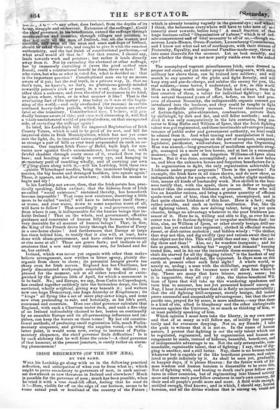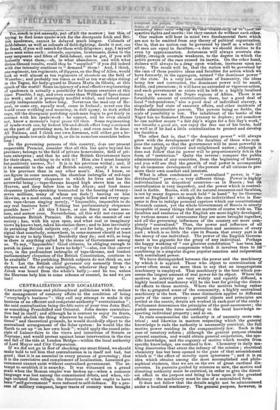IRISH REGIMENTS (OF THE NEW /ERA). BY THE SAME.
WILL his Lordship go along with us in the following practical reflection, and anticipation of what can be from what is; which ought to prove consolatory to governors of men, in such univer- sal downbreak as now threatens in Ireland and elsewhere ? Much is possible for the governor of men ; much has been possible, when he tried it with a true dead-lift effort, feeling that he must do it I—Here, visible far off on the edge of our horizon, seems to be some actual peak or headland of the country of the Future.; which is already looming vaguely in the general eye ; and which; I think, the helmsman everywhere will have to take note of, and intently steer towards, before long I A small fraction of that huge business called " Organization of Labour," which is of ine. nite concernment end-of vital necessity 10all of us,—though nu- merous Louis-Blancs,wen-Fourier; Luxembourg-Commissions, and I know not what sad set of soothsayers, with their dreams of Fraternity, Equality, and universal Paradise-made-easy, throw it into some discredit for the moment. Let us look steadily, and see whether the thing is not now partly visible even to the naked eye The unemployed vagrant miscellaneous Irish, once dressed in proper red coats, and put under proper drill-sergeants, with strict military law above them, can be trained into soldiers; and will march to any quarter of the globe and fight fiercely, and will keep step and pas-de-charge, and subdue the enemy for you, like real soldiers —none better, I understand, or few, in this world. Here is a thing worth noting. The Irish had always, from the first creation of them, a talent for individual fighting : but it took several thousand years of effort, before, on hest and pres- sure of clearest Necessity, the indispensable organic concert got introduced into the business, and they could be taught to fight in this profitable military manner. Several thousand years of faction-fights, pike-skirmishes, combustions, private duels by shillelagh, by dirk and fist, and still feller methods ; and in- deed it was only comparatively in the late centuries, long pos- terior to King Rufus and William of Ipres, that the Irish fighting talent was got regimented, and these inestimable advantages (main- tenance of publicorder and government authority, no less) could be educed from it. And what taming and manipulation it took ; how many agonistic struggles on the part of sergeant, conqueror, legislator, pacificator, wolf-subduer, howsoever the Organizing Man was named,—long generations of multiform agonistic strug. gle, managed in a more or less heroic, and at last in a successful manner,—the gods and the forgotten Williams-of-Ipres alone know. But it was done, accomplished ; and we see it now before us, and bless the unknown heroes and forgotten benefactors for it.
Is organization to fight, the only organization achievable by Irishmen under proper sergeants ? There is the question! For example, the Irish have in all times shown, and do now show, an indisputable talent for spade-work, which, under slight modifica- tion, means all kinds of husbandry work. Men skilled in the busi- ness testify that, with the spade, there is no defter or tougher worker than the common Irishman at present. None who will live on humbler rations, and bring a greater quantity of efficient spade-work out of him, than the vagrant, unemployed, and in fact quite chaotic Irishman of this hour. Here is a fact ; really rather notable, and such as invites meditation. For, like the old fighting talent, this new delving talent., being as yet quite chaotic, brings no advantage whatever to the poor Irishman pos- sessor of it. Here he is, willing and able to dig, as ever his an- cestor was to do faction-fighting or irregular multiform duel : but him, alas, no William of Ipres, or other sternly benign drill-ser- geant, has yet ranked into regiment ; clothed in effectual woollen russet, or drab cotton moleskin; and bidden wisely : "Go thither, that way not this, and dig swiftly (pay and rations await thee) for that object not for this. This will profit thee and me ; that will not : dig there and thus!" Alas, no; he wanders inorganic ; and his fate at present, with nothing but "supply and demand" buzzing round him, and in his ear the inexorable doom-summons, "Thou shalt die starved for all thy digging talent," is the hardest of any creature's,—and I should say, the unjustest. Is there seen on this earth at present other such ratal sight? A whole world, or nearly so, undug ; a man with the skilfullest, eagerest digging- talent, condemned to die because none will show him where to dig. There are many that have leisure, money, sense; but i it s impossible, they all cry Alas, the thrice-beneficial Wil- liam of Ipres that will take up this wandering spademan and turn him to account, has not yet presented himself among us. Nay, I hear it said everywhere that he is flatly an inconceivability; that the old fighting drill-sergeant, sternly benign, did indeed prove successful and unspeakably advantageous; but that the new pacific one, prayed for by some, is mere madness,—nay that there is a kind of sin, allied to blasphemy and the other unforgivable treasons against the Universe, in so much as thinking of bun, or at least publicly speaking of him.
Which opinion I must here take the liberty, in my own name and that of as many as will follow me, of mildly but perm?. torily and for evermore denying. Not so, my friends ; I teas the gods to witness that it is not so. In the name of human nature, I protest that fighting is not the only talent which can be regulated, regimented, and by organization and human ar- rangement be made, instead of hideous, beautiful, beneficent, and of indispensable advantage to us. Not the only arrangeable, com- mendable, captainable talent, that of fighting ; I say, that of dig- ging is another, and a still better. Nay, there is no human talent whatever but is capable of the like beneficent process, and calcu- lated to profit infinitely by it. As shall be seen yet, gradually, in happier days, if it please Heaven : for the future work of hu- man wisdom and human heroism is discernible to be even this, Not of fighting with, and beating to death one's poor fellow crea- tures in other countries, but of regimenting into blessed activity more and more one's poor fellow creatures in one's own country, for their and all people's profit more and more. A field wide enough, untilled enough, God knows ; and in which, I should say, human, heroism, and all the divine wisdom that is among my could-no' ^0N0114Y.
/ Yes, much is yet unready, put off till the morrow ; but this, of trying to find some spade-work for the disorganic Irish and Bri- tish spademan, cannot be delayed much longer. Colonels of field-labour, as well as colonels of field-fighting, doubt it not, can be found, if you will search for them with diligence; nay, I myself have seen some such : colonels, captains, lieutenants, down to the very sergeants and lifers of field-labour, can be got, if you will honestly want them,—oh, in what abundance, and with what thrice-blessed results, could they be "supplied" if you did indeed ,
with due intensity continue to demand" them ! And, I think, one regiment, ten regiments, of diggers, on the Bog of Allen, would look as well almost as ten regiments of shooters on the field of Waterloo ; and probably ten times as well as ten war-ships riding in the Tagus, for body-guard to Donna .Maria da Gloria at this epoch of the world! Some incipiency of a real effective regimenting of spademen is actually a possibility for human creatures at this time. Possible, I say, and even easier than William of Ipres found his work ; and it is pressingly needful withal, and indeed prac- tically indispensable before long. Never can the mad cry of Re- peal, or some cry, equally mad, cease in Ireland ; never can the world cease writhing and moaning, in dull agony, in dark stifled rage, till the disorganic perishing spademan begin to get fairly in contact with his spade-work : he cannot, and he even should not, know a moment's loyal peace till then. Some regimenting of spade-work can, by honest life-and-death effort long continued on the part of governing men, be done ; and even must be done. All Nations, and I think our own foremost, will either get a be- ginning made towards doing it, or die in nameless anarchies before long !
Do the governing persons of this country, does our present respectable Premier, consider that all this lies quite beyond his province; belongs to the field of private benevolence, field of pri- vate enterprise ; and that he and the British Government have for their share, nothing to do with it ? Him also I must humbly but positively answer, No! It is in his province withal ; and, if it be essential to the ends of British society, surely it is more in his province than in any other man's. Alas, I know, or can figure in some measure, the shoreless imbroglio of red-tape and parliamentary eloquence in which he lives and has his sorrowful being ;—tape-thrums heaped high above him as the Heaven, and deep below him as the Abyss; and loud inane eloquence (public-speaking transacted in the hearing of twenty- seven millions, many of whom are fools!) beating on him likewise, as a mad ocean, and every single billow and every sepa- rate rate tape-thrum singing merely, Impossible, impossible to do any real business here! Nothing but parliamentary eloquence possible here!" All this I know, or can fancy in some mea- sure, and sorrow over. Nevertheless, all this will not excuse an unfortunate British Premier. He stands at the summit of our society ; has, with his eyes open, and what real or imaginary views he knows best, taken his station there ; and to him inevitably do perishing British subjects cry,—if not for help, yet for some signal that somebody, somewhere, in some manner should at least begin to try to help them ! Decidedly they do; and will, so long as there is anything called by the name of Government among us. To say, "Impossible! Good citizens, be obliging enough to perish in peace : you see I have no help! "—alas, can that answer ever in the profoundest imbroglio of tape-thrums, and loudest parliamentary eloquence of the British Constitution, continue to be available ? The perishing British subjects do not think so, nor do- I. Let the British chief governor cry earnestly from the abysses and the red-tape imbroglios, whatever they may be : a Jonah was heard from the whale's belly ;—and he too, unless the Heavens help him to some scheme or counsel, he and we are



























 Previous page
Previous page